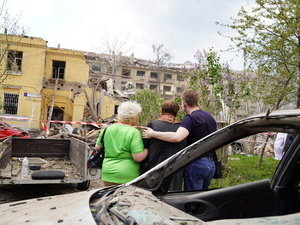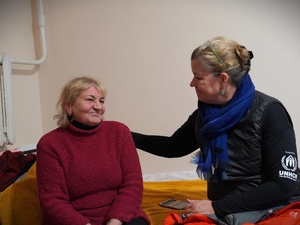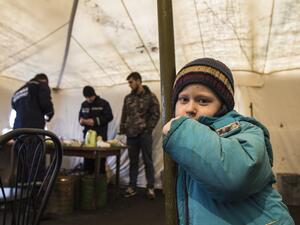Russian Federation: continuing effects on IDPs in Ingushetia in aftermath of June 21 attack
Russian Federation: continuing effects on IDPs in Ingushetia in aftermath of June 21 attack
A clearer picture is now emerging about the aftermath of the horrific attack that took place in Ingushetia on 21 June, in which around 90 people were reported killed, and the effects this event had on the 50,000 internally displaced people (IDPs) from Chechnya residing in Ingushetia. Inevitably, there was a strong response by the security services. Some 50 or so IDPs were temporarily detained and initially there were fears the security response might seriously jeopardise the human rights of innocent people. However, the great majority of those detained have now been released. We understand that only five IDPs remain in custody and have been formally charged. Police operations and ID checks are continuing in the temporary settlements, but we have not heard of any recent complaints of improper behaviour.
Immediately after the attack, all international aid staff were relocated elsewhere in the Russian Federation, and for several days it was very difficult for local staff to operate. While some international NGO staff resumed working in Ingushetia at the end of June, UN international staff - including UNHCR - are still not back, since the authorities say they do not have sufficient armed guards to guarantee their safety. UNHCR hopes that this situation will be resolved shortly, especially after a planned return of international staff this Wednesday once again failed to happen for the same reason. Nevertheless, local UNHCR and NGO staff on the ground resumed monitoring the situation in the temporary settlements towards the end of June. As of earlier this week they had visited 54 of the temporary settlements, housing around 75 percent of the temporary settlement population (some 18,000 people out of a total of 24,000 in all 181 temporary settlements).
While the situation has stabilized somewhat, there is no doubt many IDPs came under substantial pressure following the 21 June attack. For the most part, this took the form of hostile reaction by some of the local Ingush population. It was also reported that some local officials were applying heavy psychological pressure on IDPs to return home. Local landowners, and in some cases local officials as well, threatened to evict IDPs from a number of settlements. However, so far only one settlement, MTF Altievo, has actually been closed. This was the settlement where the five detained IDPs were living.
However, a total of 20 temporary settlements, hosting around 7,800 IDPs, are either still under threat of eviction or are affected by utility cuts. As with the closure of the tented camps - the last of which was shut down in early June - the litmus test for voluntary return is the availability of alternative accommodation inside Ingushetia. It seems that in some cases where eviction is still threatened, no alternative has been proposed apart from return to Chechnya. UNHCR has officially raised its concerns about the threats of eviction, the utility cuts and the initial detentions with the authorities both in Ingushetia and in Moscow. However, our ability to intervene in Ingushetia is still hampered by the fact that the international staff have not been able to go back yet.
UNHCR appreciates the fact that the Head of the Ingush Migration Service visited several temporary settlements last week and reassured the IDPs in them that the Migration Service would continue to support them.
It is estimated the number of returns and applications to return to Chechnya since 22 June stands at somewhere between 3,500-4,000 - only slightly higher than the high-end average monthly return.
Meanwhile, the 28,000 or so IDPs living in private accommodation, as opposed to temporary settlements, seem to have been largely unaffected by the public backlash.
It should be noted that around half the remaining IDPs from Chechnya are actually Chechens, and the other half are Ingush. It is for this reason that UNHCR does not refer simply to "Chechen IDPs".









